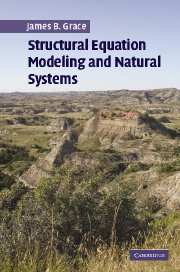Book contents
- Frontmatter
- Contents
- Preface
- Acknowledgments
- PART I A BEGINNING
- PART II BASIC PRINCIPLES OF STRUCTURAL EQUATION MODELING
- PART III ADVANCED TOPICS
- PART IV APPLICATIONS AND ILLUSTRATIONS
- 8 Model evaluation in practice
- 9 Multivariate experiments
- 10 The systematic use of SEM: an example
- 11 Cautions and recommendations
- PART V THE IMPLICATIONS OF STRUCTURAL EQUATION MODELING FOR THE STUDY OF NATURAL SYSTEMS
- Appendix I Example analyses
- References
- Index
11 - Cautions and recommendations
Published online by Cambridge University Press: 04 December 2009
- Frontmatter
- Contents
- Preface
- Acknowledgments
- PART I A BEGINNING
- PART II BASIC PRINCIPLES OF STRUCTURAL EQUATION MODELING
- PART III ADVANCED TOPICS
- PART IV APPLICATIONS AND ILLUSTRATIONS
- 8 Model evaluation in practice
- 9 Multivariate experiments
- 10 The systematic use of SEM: an example
- 11 Cautions and recommendations
- PART V THE IMPLICATIONS OF STRUCTURAL EQUATION MODELING FOR THE STUDY OF NATURAL SYSTEMS
- Appendix I Example analyses
- References
- Index
Summary
In this chapter I consider some of the pitfalls that can be encountered, and present a few recommendations that may help to avoid problems in implementing and interpreting results from SEM. Once the reader is finished with this chapter, they may wish to visit Appendix I to see how some of the recommendations from this chapter are applied to example SEM applications.
General limits of statistical analysis
Robert Abelson, a statistics professor at Yale for many years, published a book a few years ago entitled, Statistics as Principled Argument (1995). The thesis of this book is that the proper use for statistical analyses and results is as an aid to interpretation rather than as a set of rigid protocols for establishing facts. A related principle is that statistical analysis of data is a matter of approximation. We seek to use models that are approximately correct for our systems. We rely on samples of data that are hoped to approximate some larger population. We rely on distributional assumptions that are approximately correct. And, we hope that our next effort will be an even better approximation.
Those of us in fields that are just beginning to use SEM are in the luxurious position of being able to benefit from decades of intense work that has gone on in other disciplines. Structural equation modeling developed to its current state through the combined efforts of practitioners working in a variety of fields, but especially the humanities.
- Type
- Chapter
- Information
- Structural Equation Modeling and Natural Systems , pp. 275 - 288Publisher: Cambridge University PressPrint publication year: 2006



